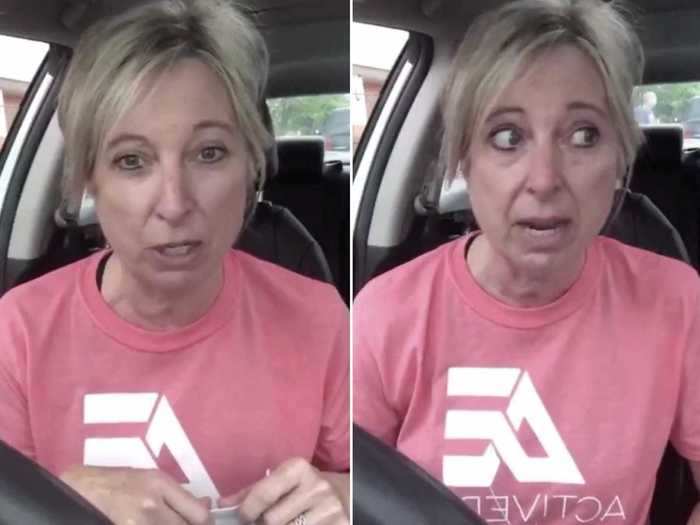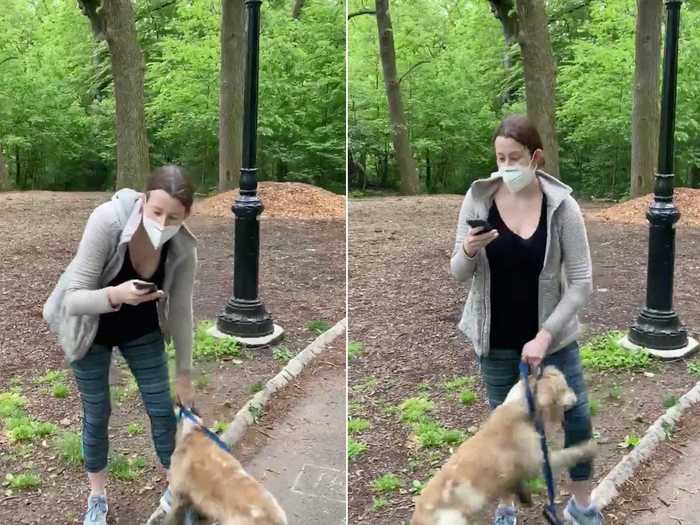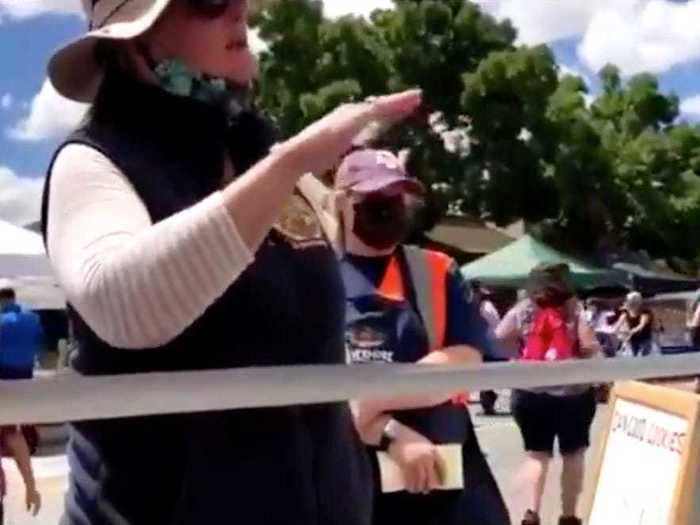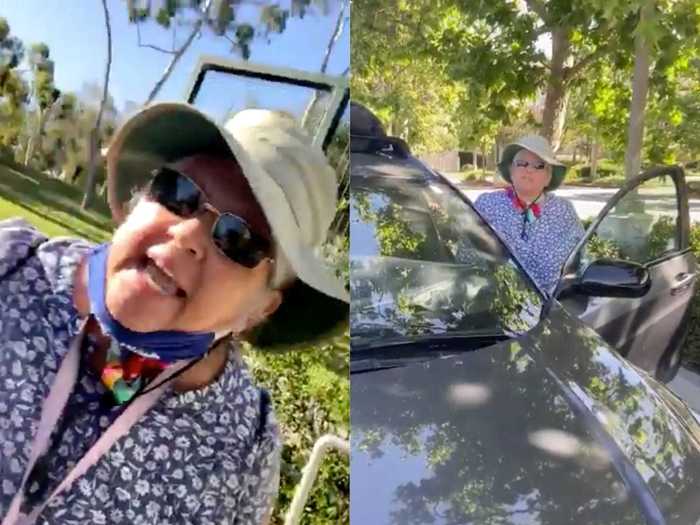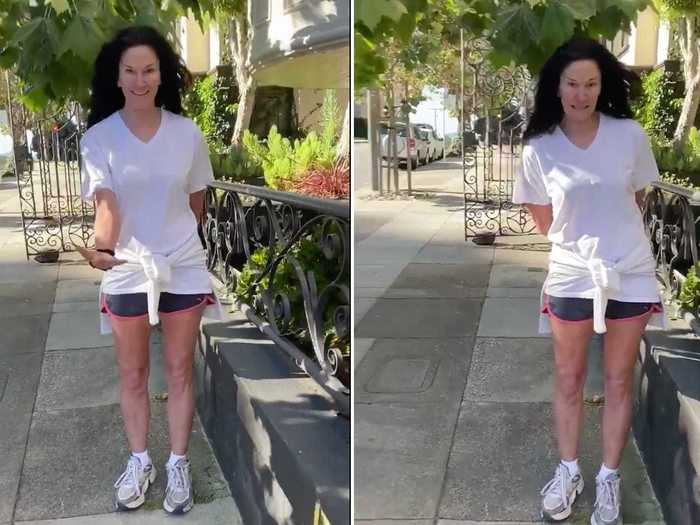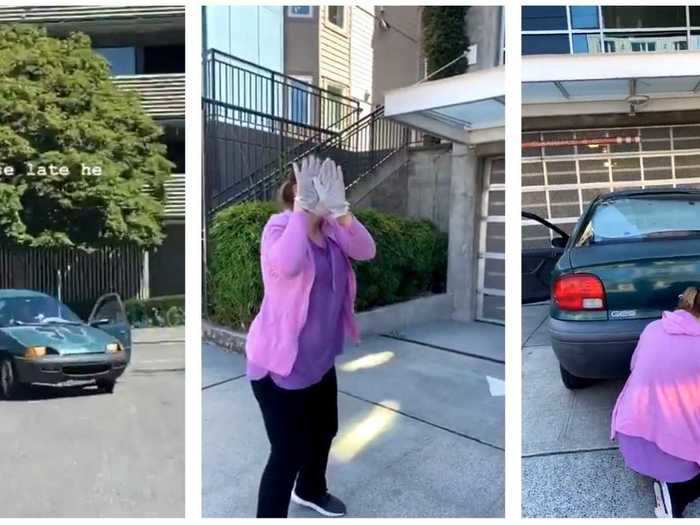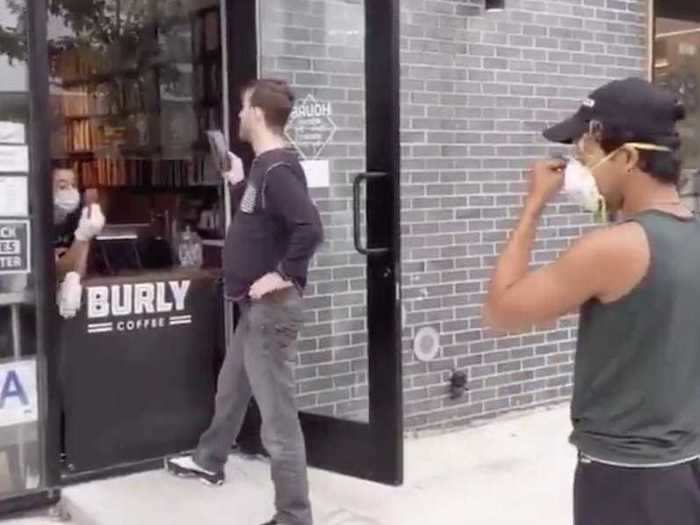"Karens" have emerged in grocery stores, in apartment complexes, and on sidewalks.@rmtennell/@melodyMcooper/@jaimetoons/Twitter
- So-called "Karen" content has gone mainstream as tensions have risen around the pandemic and nationwide protests.
- While the "Karen" moniker has existed for a while, a recent deluge of viral videos and incidents have made the term a cultural phenomenon.
- The term "Karen" itself has become controversial, with some arguing it's sexist and racist.
- This is a timeline of how the term "Karen" jumped into mainstream culture during quarantine.
So-called "Karen" videos have become a staple on social media. Meme accounts like "karensgoingwild" broadcast "Karen" incidents to millions of followers, and almost every day there's a new trending "Karen" caught on tape.
What first began as meme shorthand to describe white women acting in an entitled way has become a part of the vernacular — a succinct way to clock white women behaving badly, especially when that behavior involves racism or another form of discrimination.
The "Karen" archetype has always existed in some form or other (see also: Becky), but the twin factors of the COVID-19 pandemic and the conversation around race and police brutality following the death of George Floyd have turned "Karen"-spotting into something of a national pastime. In recent months, "Karens" have waged war against wearing masks, pointed guns at Black Lives Matter protestors, and called the police on a Black birder.
"Karen"-ing has become a way of confronting the complicated space white women occupy as victims of misogyny and gendered discrimination, possessors of privilege, and perpetrators of racism. Many have criticized the term as sexist, noting there's not a similar trend around white men who have committed similar trangressions. Some worry about the impact of mass outrage over video snippets that flatten a person's life into a single recorded moment, leaving them vulnerable to doxxing and harassment. And still others argue against using the name "Karen" because they say it gives a non-threatening and de-personalized moniker to deeply harmful behavior — effectively allowing these women to distance themselves from their actions.
Despite the wide range of opinions surrounding "Karen" memes and stories, the viral videos have captured the news cycle and taken over the internet.
Here's a history of how the term has exploded into the mainstream.
Before the current news cycle, the "Karen" meme was loosely connected to the archetype of an entitled white woman.
The "speak to a manager haircut" was a meme predecessor to the "Karen" meme.
Know Your Meme
The "Karen" meme was previously defined in vaguer terms than it is today.
As Insider's Rachel Greenspan reported, the "Karen" meme was preceded by similar memes like the "speak to the manager haircut." That meme, which evoked a particular type of middle-class woman, helped contribute to the archetype that would eventually morph into the "Karen" meme.
As Time's Cady Lang writes, the "Karen" meme "confronts the violent history of white womanhood," building on historical narratives that date back to the time of American slavery.
The use of the name "Karen" in particular, appears to have arisen out of a variety of media, including a 2005 Dane Cook comedy special that featured a joke about a "Karen" character as well as the iconic "Mean Girls" line: "Oh my God, Karen, you can't just ask people why they're white."
In the late 2010s, the meme began to gain traction through online communities like the r/F---YouKaren subreddit (originally created by a man angry with his ex-wife). Eventually, it came to be specifically associated with incidents in which white women confronted, taunted, and policed Black people.
Beginning in May, videos of anti-mask "Karens" began to circulate on social media.
One woman in a now-viral video claimed that masks were not a necessary precaution.
@bryantylercohen/Twitter
A May 25 video showing Amy Cooper calling the police on a Black man made "Karen" a household term.
The video of Cooper sparked mainstream discussion about white women's entitlement.
Melody Cooper/Twitter
A video showing Amy Cooper calling the police on Christian Cooper (the two are unrelated), a Black bird-watcher who asked her to leash her dog in Central Park, brought "Karen" discourse well and truly into the mainstream. The incident occurred on the same day as George Floyd's death.
After the video of Cooper dragging her dog by the collar and calling the police to say that there was an "African-American man threatening [her] life" went viral, people called out her racist behavior.
Amy Cooper faced several consequences as a result: she lost her job at an investment firm and briefly gave up her dog to the shelter from which she adopted it (she eventually got the dog back). She later apologized and said that her actions were "unacceptable." Christan Cooper acknowledged her apology but told CNN that her actions were "definitely racist."
New York City mayor Bill De Blasio spoke about the incident, calling it "disgusting" and questioning whether making a false accusation to police was a crime.
The New York Times' Ginia Bellanfate wrote that in the "most forgiving interpretation of these events," Amy Cooper would be that she was unaware that calling the police on a Black man could end in injury or death. One white mother of two Black sons, Kimberly Witt, wrote in an essay published in Insider that the incident, which occurred on the same day that George Floyd was killed in police custody, "confirmed that [her] kids won't be safe anywhere."
"Karens" have also been called out for homophobia.
The farmers' market association the woman runs resigned from running the farmers' market in Livermore, CA following the video.
karli_harward_Twitter
A farmers' market organizer resigned from operating a local market after a video of one of its organizers berating a vendor for handing out pride flags circulated online.
The June 7 video depicted Gail Hayden, who runs the California Farmers' Market Association (CFMA), telling vendor Dan Floyd, who owns Dan Good Cookies, that he wasn't allowed to hand out LGBTQ+ Pride flags at the market. Following the video's circulation online, the CFMA head resigned from running the farmers' market in Livermore, California.
Hayden told Insider that the incident was a "huge misunderstanding because it was not targeted to anybody due to their sexuality," saying, "It's very unfortunate that this happened."
"While we were focused on enforcing the market's rules, we neglected to see the bigger picture Dan was expressing with his Pride flags," a statement posted on the CFMA website said. "The LGBTQ+ community deserves a tolerant environment to express and celebrate their identity. We should not have allowed the escalation of the conversation to take place and we apologize for the inaccurate implications that were made."
In southern California, multiple "Karen" videos of the same person led to a police investigation.
The woman who made anti-Asian statements in two viral videos has been identified by the Torrance Police Department as Lena Hernandez.
@rmtennell/@brendonmcnerney/Twitter
Police in Torrance, California, are investigating Lena Hernandez, a woman who police have associated with multiple viral incidents featuring a woman yelling racist, anti-Asian sentiments at people in public.
The first viral video featured the woman identified as Hernandez telling a woman working out on stairs in a park to "go back to whatever f---ing Asian country you belong in." The second video showed the same woman threatening a man's life in a parking lot and calling him a slur.
Police also associated Hernandez with a third incident that took place in October 2019 in which a woman yelled and cursed at a female custodian and later pushed down and punched someone who tried to intervene.
According to a press release from the Torrance Police Department, police located Hernandez in a park in San Pedro on July 17 and spoke with her about the three incidents. The release says that given that the three incidents are misdemeanor crimes and did not occur in the presence of an officer, Hernandez was not arrested at the time, but the details of the interview will be submitted to the City of Torrance Prosecutor's office.
One of the biggest "Karen" flashpoint incidents happened when a white man and woman called the police on a man for stenciling "Black Lives Matter" outside his home in chalk.
Lisa Alexander, the woman in the video, later apologized for her actions.
@jaimetoons/Twitter
A common theme among "Karens" is the unsolicited policing of Black people.
A June 12 video captured a white couple confronting San Francisco resident James Juanillo for stenciling "Black Lives Matter" in chalk outside his home.
At one point the white man in the video, Robert, tells Juanillo that he is free to express [his] opinions" but "not on people's property." When Juanillo asks if they thought his actions would be fine if he did live there, the woman, Lisa, claims that she knows the homeowner.
The video went viral on Twitter, with Juanillo's original tweet amassing over 600,000 likes.
Lisa was identified as Lisa Alexander, the CEO of cosmetics company LaFace, and later apologized for her actions, saying, "There are not enough words to describe how truly sorry I am for being disrespectful to him last Tuesday when I made the decision to question him about what he was doing in front of his home."
Following the incident, beauty brand Birchbox issued a statement saying that they were completely cutting ties with LaFace.
The man in the video, who ABC 7 News reported was Robert Larkins, was later fired from financial services firm Raymond James. Per ABC 7 News, Larkins also issued an apology, saying, "I was wrong to question Mr. Juanillo, and I was wrong to call the neighborhood police watch."
By late June, "Karen" was a well-known archetype that was being folded into viral incidents, including one involving law enforcement.
The woman has been called "McMuffin Cop" or "Officer Karen" online.
Perez Hilton/YouTube
In late June, a tearful video recorded by a Georgia sheriff's deputy at a McDonald's drive-thru went viral, with people calling her a "McMuffin Cop" or "Officer Karen."
Stacy Talbert filmed herself on the verge of tears as she talked about the fear she felt while waiting for her food at McDonald's, worried that an employee might have tampered with her meal because she was a cop.
"This feeling we feel in law enforcement constantly," she told BuzzFeed News. "You're always looking, we're arching our necks, to make sure everything is safe not just for you, but for everyone else. There are times I wish I could just be normal and not have to feel like that."
The video was met with widespread derision — with many on social media poking fun at her dramatic claims. Talbert's video also fell into "Karen" discourse, with people on social media mocking her extreme reaction to her food being late.
But Talbert stands by it.
"Everyone completely lost the point except for law enforcement," she told BuzzFeed News. "We all feel that way except I voiced it."
At the same time as there was a spike in coronavirus cases, more anti-mask "Karen" videos began to go viral.
In one clip, a woman told store employees that they were "sheep" for insisting on wearing masks and said that "there's really no f---ing virus."
@diodit/Reddit
As states around the country reopened, coronavirus cases surged. It also led to more videos of anti-mask "Karens."
In one video shared in the "Public Freakouts" subreddit, a woman began filming employees of Crossroads Trading Company who were handing out masks to customers as they entered the store, the Daily Dot reported on June 20. The woman refused a mask, saying that she had a health condition preventing her from wearing one.
When an employee attempted to explain store policy that customers must wear masks to be allowed inside, the woman interrupted, insisting that she was protected by the Americans with Disabilities Act, at one point calling the employees "sheep," and saying that "there's really no f---ing virus."
Another incident posted on Twitter on June 26 captured a white woman in a North Hollywood Trader Joe's who refused to wear a mask, claiming to have a "breathing problem." Twitter user @ItsRellzWorld posted a video of the incident, dubbing the woman "Karen of the San Fernando Valley."
In the clip, a woman threw her plastic shopping basket on the ground and called shoppers and employees at the store "Democratic pigs" after being asked to wear a mask.
"I have a breathing problem. My doctor would not let me wear a mask," she says in another video from @ItsRellzWorld, facing the camera. "So anyone harassing me to wear a mask, you guys are violating federal law, do you get that? Get that on camera."
The woman was ultimately escorted from the store, Newsweek reported.
The problem with the meme is that many "Karen" videos are presented without much context, Critics say this can lead to doxxing and harassment.
This video was viewed more than 8 million times.
@khoaphan/Twitter; @wypipo_h8/Twitter
While "Karen" videos have become more frequent in recent months, they've also been more heavily scrutinized.
Given the nature of how many "Karens" are caught — in recorded and uploaded video clips — critics argue that many viral "Karen" incidents have lacked context, and are often simply seconds-long windows into an interaction. Video clips can also easily be manipulated and re-edited to skew the narrative.
An example of a contextless video was posted on Twitter by Karlos Dillard that went viral on June 23. In the video, Dillard, a Black man, films himself following a white woman home. Dillard claims in the clip that the woman had cut him off while driving and used racial slurs against him. In the video, the woman can be seen attempting to cover her face and her license plate, concerned about being labeled a "Karen."
It's unclear from the video what actually happened. Dillard's video contains no evidence of the woman's alleged transgression, and details around the interaction remain murky. Dillard has been involved in previous viral callouts, causing some to question the details of his story. He also began selling merchandise related to the incident after it went viral.
While women have largely been the meme's focus, viral videos of men behaving in similar ways have also surfaced. Social media users have dubbed the male version of a "Karen" as a "Kevin" or "Ken."
In the viral clip, a mask-less man stood outside a coffee shop in Brooklyn and protested the establishment's "Black Lives Matter" sign.
@AIRSTEVEJOBS/Twitter


